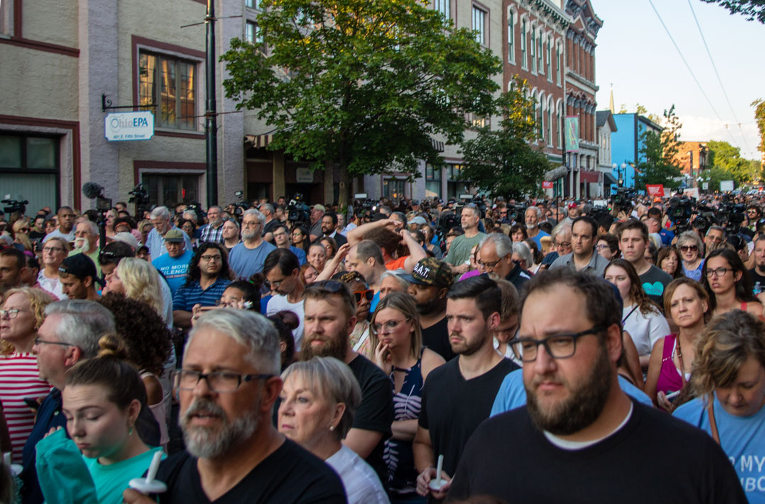We were never not at war. By we I mean the colonizers of this continent, who waged war first against Native North America’s original occupants and then entered into a state of war to keep kidnapped Africans subjugated in slavery. After the official Indian wars ended, we found other means to keep Native people confined and disempowered. After slavery officially ended, we found other means to keep black people impoverished and disempowered. Those means were forms of war.
We launched a war to steal Mexico’s northern half, a project completed in 1848 with the acquisition of what is now California, Nevada, Utah, Arizona (minus the Gadsden purchase), part of Colorado, and New Mexico. Texas had already been seized by dubious means, in part because its Yankee settlers refused to accept Mexican law banning slavery. Then we treated Latinx people, even those who had been here before “here” was the USA, as invaders.
There’s a long history of massacres in response to slave uprisings and Native resistance, and the police killings of black people and white male killing of Native women might as well be called war by other means. The US began with a declaration that “all men are created equal” that left out all women, and since then its history has too often been devoted to perpetrating inequality. Recent mass shootings driven by racism and misogyny are a more extreme means of enforcing an oppression built into our economic and legal systems, and may be the result of a panic that those systems are not containing others well enough.
“War” might as well describe the domestic violence so epidemic that “on average, 24 people per minute are victims of rape, physical violence or stalking by an intimate partner in the United States”, according to the National Domestic Violence Hotline, with an average of four domestic violence deaths a day. Of course the majority of perpetrators are men; the majority of victims are women.
We are a country at war, but who that “we” is – in a nation where so many have been so disenfranchised – should be central to the conversation. There are more guns in the US than people, and the rhetoric of gun rights has been used to defend the rights of these killing machines to spread everywhere – classrooms, Walmarts, public places, homes where children have access to them.
And the people most likely to own guns are those who have been the aggressors in these wars: men, particularly white men, who commit almost all the mass shootings in this country. As social media commentators have noted, if it were Islamic or other “other” groups committing multiple massacres there would be no doubt that this was terrorism. And as Jason Stanley notes early in his book How Fascism Works, “The most telling symptom of fascist politics is division. It aims to separate a population into an ‘us’ and a ‘them.’” But these divisions by race, religion, and gender have always structured the United States.
Except that the old FBI was reluctant to take on rightwing violence too. When an Obama official warned in 2009 of a coming “resurgence of rightwing extremist activity and associated violence in the United States”, he recalled in 2017, a “political backlash ensued because of an objection to the label ‘rightwing extremism’.” Ultimately “Republican lawmakers demanded then homeland security secretary Janet Napolitano rescind my report”.
In other words, the problem is the people who have always been in power and control. The government that is supposed to be in charge of protecting all of us is a partisan in this war and to some extent always has been. Now the Republican party is openly partisan, openly the enemy of a majority of people in this country that is less than a third white males.
We were never not at war, but in recent years the cold civil war has heated up. The white men who expected unquestioned supremacy, by race and by gender, have launched a civil war against the rest of us, not least by allowing a huge number of high-capacity weapons of war to circulate throughout the country and supporting the NRA’s propaganda project to further fortify a set of fears and identifications between freedom, guns, masculinity and white supremacy. The Republican party has in essence declared war against the United States – against the people, the environment, the constitution, the rule of law, against voting rights and free and fair elections. The threats are coming from inside the Capitol.
After the El Paso massacre by a racist with an anti-immigrant manifesto, people are saying out loud that the president is culpable. But he is gasoline on a fire laid long before, an extreme version of old hates and problems. And of the entitlement that always seems like the most noteworthy and least noted aspect of violence: the idea that anyone has the right to to punish, deprive of rights and safety and even kill others. In May, he said, “How do you stop these people?” and complained that the border patrol can’t use weapons, and then chuckled when an audience member called out “shoot them”. This weekend someone shot his version of “them” in El Paso.
We think of armies as organized bodies with clear structures and centers. But the internet has created a guerrilla army of rightwing young white men infected by contagious and toxic ideas. The internet, as it was created by the hubristic white men of Silicon Valley, is an indoctrination, organizing tool, manifesto distribution means and shopping system (the Dayton killer bought his AR-15 style rifle online from Texas). It’s also an amplifier of alienation and extremism. That many of these young men are lonely and miserable and isolated, and that there is no clear border between white supremacists and incel misogynists, two groups linked to mass shootings, speaks to how the internet works.
That Cloudflare has stopped hosting the hate-spreading 8Chan is, like the meaningless gestures Google, Twitter and Facebook regularly engage in after being implicated in the spread of hate at home and abroad, too little too late. The tech giants, arms dealers in the civil war, are concerned only with whitewashing their own culpability.
I wonder about how wars end, especially civil wars. How do people attached to their partisanship leave it behind? How do people find a sense of belonging to the whole rather than their divisive part? If slavery was the original sin of the US (along with genocide against Native North Americans), then the failure to finish the American civil war with a decisive victory against the Confederacy that ensured rights for black citizens and abandonment of the rhetoric and symbols of Dixie is how that sin never died.
Six of the nine people massacred in Dayton were black. Black people were the targets in the Charleston church massacre in 2015. We’ve had mass shootings in synagogues and a Sikh temple and many attacks on Muslims. How does the definition of “we” become broader and more inclusive, rather than shrinking down to Christianity and whiteness and maleness? How do you launch a peace? How does love become more powerful than hate? How do we unravel the forces shaping these miserable young white men and reincorporate them into the broader society? How do we de-legitimize the entitlement to violence? What might inoculate lonely young men against the viral contagion of mass shootings that have spread since Columbine like a slow pandemic?
We must remember that this war has stepped up because white men feel threatened in what they consider a zero-sum game: if they don’t have everything they imagine they won’t have enough, a threat whipped up by rightwing media and the Republican party. The Republican party’s decision to become the party of white grievance will be in the long run a losing strategy in an increasingly nonwhite nation. But conservative white Americans are determined to hold on to power, and will use gerrymandering, voting suppression and other tactics to openly defy the ideals of democracy and equality.
Women of color are advancing in power; the president’s recent attacks on representatives Ilhan Omar, Ayanna Pressley, Alexandria Ocasio-Cortez and Rashida Tlaib are red meat for his base, but also a reminder that among the four are the first black woman elected to national office from Massachusetts, the first Muslim women elected to Congress, and the young Latina who beat an old white man.
The threat they pose to the old white Christian male hegemony is real. I think that in the long run the larger, more generous American “we” will win, but that does not make the carnage acceptable or map out how to dilute the divides, or whether the work to do so is going to be carried out entirely by the victims and not the perpetrators. The war is because the future USA will not look like the past USA, in who is here and who has rights and powers. The question is how we survive the transition – or rather how we shape it so that the vulnerable survive and thrive.
Teaser photo credit: By Becker1999 from Grove City, OH – 05-(1b), CC BY 2.0





